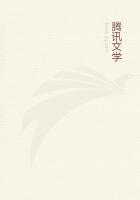Dividing, on their entrance into the chapel, into two lines, the attendants of the knights-companions flanked either side of the north aisle; while between them walked the alms-knights, the verger, the prebends of the college, and the officers-of-arms, who proceeded as far as the west door of the choir, where they stopped.A slight pause then ensued, after which the king, the knights-companions, and the chief officers of the Order, entered the chapter-house--a chamber situated at the north-east corner of the chapel--leaving the Duke of Richmond, the sword-bearer, Lard Rochford, the knight-elect, the train-bearers, and pensioners outside.The door of the chapter-house being closed by the black-rod, the king proceeded to the upper end of the vestments-board--as the table was designated--where a chair, cushions, and cloth of state were provided for him; the knights-companions, whose stalls in the choir were on the same side as his own, seating themselves on his right, and those whose posts were on the prince's side taking their places on the left.The prelate and the chancellor stood at the upper end of the table; the Garter and register at the foot; while the door was kept by the black-rod.
As soon as the king and the knights were seated, intimation was given by an usher to the black-rod that the newly elected knight, Lord Rochford, was without.The intelligence being communicated to the king, he ordered the Dukes of Suffolk and Norfolk to bring him into his presence.The injunction was obeyed, and the knight-elect presently made his appearance, the Garter marching before him to the king.
Bowing reverently to the sovereign, Rochford, in a brief speech, expressed his gratitude for the signal honour conferred upon him, and at its close set his left foot upon a gilt stool, placed for him by the Garter, who pronounced the following admonition:--" My good lord, the loving company of the Order of the Garter have received you as their brother and fellow.In token whereof, they give you this garter, which God grant you may receive and wear from henceforth to His praise and glory, and to the exaltation and honour of the noble Order and yourself."Meanwhile the garter was girded on the leg of the newly-elected knight, and buckled by the Duke of Suffolk.This done, he knelt before the king, who hung a gold chain, with the image of Saint George attached to it, about his neck, while another admonition was pronounced by the chancellor.Rochford then arose, bowed to the monarch, to the knights-companions, who returned his salutations, and the investiture was complete.
Other affairs of the chapter were next discussed.Certain officers nominated since the last meeting, were sworn; letters from absent knights-companions, praying to be excused from attendance, were read--and their pleas, except in the instance of Sir Thomas Cheney, allowed.After reading the excuse of the latter, Henry uttered an angry oath, declaring he would deprive him of his vote in the chapter-house, banish him from his stall, and mulct him a hundred marks, to be paid at Saint George's altar, when Will Sommers, who was permitted to be present, whispered in his ear that the offender was kept away by the devices of Wolsey, because he was known to be friendly to the divorce, and to the interests of the lady Anne.
"Aha! by Saint Mary, is it so?" exclaimed Henry, knitting his brows.
"This shall be looked into.I have hanged a butcher just now.Let the butcher's son take warning by his fate.He has bearded me long enough.See that Sir Thomas Cheney be sent for with all despatch.Iwill hear the truth from his own lips."
He then arose, and quitting the chapter-house, proceeded with the knights-companions to the choir--the roof and walls of the sacred structure resounding with the solemn notes of the organ as they traversed the aisle.The first to enter the choir were the aIms-knights, who passed through the door in a body, and making low obeisances toward the altar and the royal stall, divided into two lines.They were succeeded by the prebends of the College, who, making similar obeisances, stationed themselves in front of the benches before the stalls of the knights-companions.Next followed the pursuivants, heralds, and provincial kings-of-arms, making like reverences, and ranging themselves with the alms-knights.Then came the knights-companions, who performed double reverences like the others, and took their stations under their stalls; then came the black-rod, Garter, and register, who having gone through the same ceremony as the others, proceeded to their form, which was placed on the south side of the choir before the sovereign's stall; then came the chancellor and prelate, whose form was likewise placed before the royal stall, but nearer to it than that allotted to the other officers; and, lastly, Henry himself, with the sword borne before him by the Duke of Richmond, who as he approached the steps of his stall bowed reverently towards the altar, and made another obeisance before seating himself.
Meanwhile the Duke of Richmond posted himself in front of the royal stall, the Earl of Oxford, as lord chamberlain, taking his station on the king's right, and the Earl of Surrey, as vice-chamberlain, on the left.As these arrangements were made, the two cardinals arrived, and proceeded to the altar.
Mass was then said, and nothing could be more striking than the appearance of the chapel during its performance.The glorious choir with its groined and pendent roof, its walls adorned with the richest stuffs, its exquisitely carved stalls, above which hung the banners of the knights-companions, together with their helmets, crests, and swords, its sumptuously--decorated altar, glittering with costly vessels, its pulpit hung with crimson damask interwoven with gold, the magnificent and varied dresses of the assemblage--all these constituted a picture of surpassing splendour.















